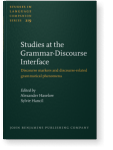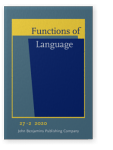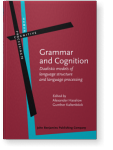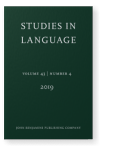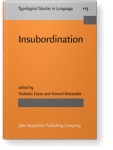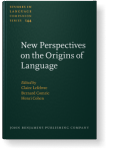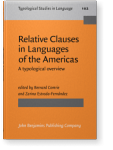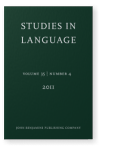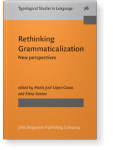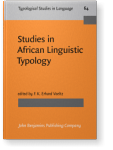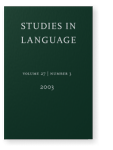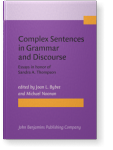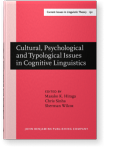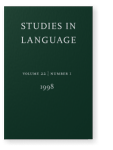Tania Kuteva
List of John Benjamins publications for which Tania Kuteva plays a role.
2021 Chapter 1. On the rise of discourse markers Studies at the Grammar-Discourse Interface: Discourse markers and discourse-related grammatical phenomena, Haselow, Alexander and Sylvie Hancil (eds.), pp. 23–56 | Chapter
Discourse markers exhibit a range of grammatical properties that set them apart from many other lexical and grammatical forms. A number of hypotheses have been proposed to account for these properties. Most commonly, such accounts have drawn on grammaticalization theory, less commonly also on the… read more
2020 On the status of wh-exclamatives in English Functions of Language 27:2, pp. 207–233 | Article
Exclamative expressions like What an enormous crowd came! and How wonderful this journey is! have been described as forming one of the four basic sentence (or clause) types of English. The present paper discusses the main features of this type and analyzes them with reference to the framework of… read more
2020 Chapter 2. Dual process frameworks on reasoning and linguistic discourse: A comparison Grammar and Cognition: Dualistic models of language structure and language processing, Haselow, Alexander and Gunther Kaltenböck (eds.), pp. 59–89 | Chapter
The objective of the present paper is to compare two kinds of research traditions that developed in the course of the last decades to understand mental and linguistic processing. One tradition relies on the perspective and methodology commonly used in social psychology, cognitive psychology and… read more
2019 The grammar of ‘non-realization’ Studies in Language 43:4, pp. 850–895 | Article
On the basis of cross-linguistic data from both genetically and geographically related and unrelated languages, in this article we argue that the linguistic phenomena usually referred to as the avertive, the frustrative and the apprehensional belong not to three but to five – semantically… read more
2016 Chapter 2. On insubordination and cooptation Insubordination, Evans, Nicholas and Honoré Watanabe (eds.), pp. 39–64 | Article
The chapter is concerned more generally with what, following Evans (2007), we call insubordinated (or insubordinate) clauses, that is, with the conventionalized main clause use of what, prima facie, appear to be formally subordinate clauses. Insubordinated clauses are, as we argue here, information… read more
2013 On the origin of Grammar New Perspectives on the Origins of Language, Lefebvre, Claire, Bernard Comrie and Henri Cohen (eds.), pp. 379–406 | Article
The goals of the present chapter are twofold. On the one hand, it aims to show the potential that studies on grammaticalization offer for reconstructing earlier phases in the evolution of language or languages, that is, phases that are not within the scope of the classical methods of historical… read more
2012 The evolution of language and elaborateness of grammar: The case of relative clauses in creole languages Relative Clauses in Languages of the Americas: A typological overview, Comrie, Bernard and Zarina Estrada-Fernández (eds.), pp. 27–46 | Article
Starting from the assumption that creole languages present an opportunity for testing hypotheses on the evolution of complexity in language, we examine the number of markers used to construct relative clauses, more specifically in relativization on subjects. On the basis of a sample of 52 creole… read more
2011 On thetical grammar Studies in Language 35:4, pp. 852–897 | Article
Most frameworks of linguistic analysis tend to highlight phenomena of language use and/or language knowledge such as sentence and word structure, while backgrounding or ignoring other phenomena that are interpreted as being of more marginal interest for the linguist. The main goal of this paper is… read more
2008 On the frills of grammaticalization Rethinking Grammaticalization: New perspectives, López-Couso, María José and Elena Seoane (eds.), pp. 189–217 | Article
The paper shows that contact-induced grammaticalization is frequently accompanied by frills, that is, by linguistic accretion instead of the commonly expected attrition. This fact adds weight to the important insights gained in recent grammaticalization studies that both language-internal and… read more
2006 The typology of relative clause formation in African languages Studies in African Linguistic Typology, Voeltz, F.K. Erhard (ed.), pp. 209–228 | Article
2003 On contact-induced grammaticalization Studies in Language 27:3, pp. 529–572 | Article
Grammaticalization is based on universal strategies of conceptual transfer. Contact-induced language change on the other hand is an areally confined process resulting from specific historical events. What this suggests is that the two constitute quite divergent phenomena and, in fact, in the… read more
2002 The symmetry of counterfactuals Complex Sentences in Grammar and Discourse: Essays in honor of Sandra A. Thompson, Bybee, Joan L. and Michael Noonan (eds.), pp. 101–124 | Article
1999 Specification in grammar Cultural, Psychological and Typological Issues in Cognitive Linguistics: Selected papers of the bi-annual ICLA meeting in Albuquerque, July 1995, Hiraga, Masako K., Chris Sinha and Sherman Wilcox (eds.), pp. 269–284 | Article
1998 On Identifying an Evasive Gram: Action Narrowly Averted Studies in Language 22:1, pp. 113–160 | Article
On the basis of data from both genetically and geographically remote languages the present paper builds a case for the existence of ACTION NARROWLY AVERTED (ANA) as a cross-linguistically identifiable gram involving the meaning was on the verge of V-ing but did not V. The paper proposes the… read more
